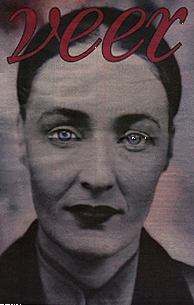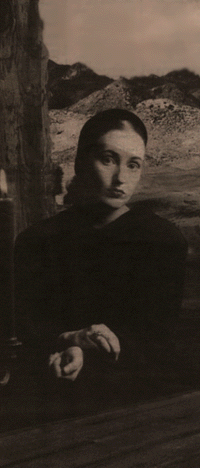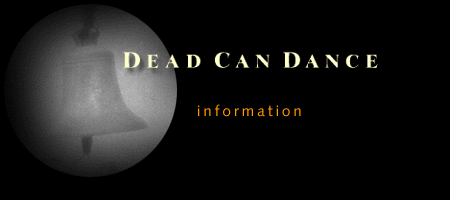-
An Enchanting Evening With Lisa Gerrard
By Jeff Maisey, VEER
August/September 1995

August/September 1995 Veer magazine cover.
My well planned day turned out to be one of ever changing circumstances. I was traveling to New York City to interview Dead Can Dance's Lisa Gerrard at Warner Brothers. She was promoting her new solo recording, The Mirror Pool, which is due out August 22nd. The Mirror Pool is a collection of songs written by Lisa over the last seven years. "There is always a surplus of work which never made its way on record"--with the exceptions of "Persian Love Song" and "Sanvean"--both of which were performed on Toward The Within, Dead Can Dance's 1994 Live recording/movie. The Mirror Pool's 16 songs are every bit as great as all of the Dead Can Dance released material.
The interview was scheduled for 6:00 p.m. My train was to arrive at 5:00 p.m., giving me ample time to maneuver through the 14 blocks between Penn. Station and the Time/Warner Building. The Amtrak Express, unfortunately, was 40 minutes late getting into Penn. Station. After a swift ascension up two flights of stairs, then through a maze of humanity, I leaped into the first cab and said, "75 Rockefeller Center as quickly as you can." The driver appeared to speak English only slightly better than I can speak German--and I only know three words of German! With 15 minutes to get to my destination, traffic at rush hour was a virtual stand still. Finally, with three blocks to go and the car stationary, I paid the cabby off and ran the remaining distance. As the elevator hoisted me to the 20th floor, I finally entered the Warner Brothers office. I told the receptionist who I was and she pointed me in the direction saying, "They're waiting for you." I had been traveling for nine hours nonstop as I blew into the Conference Room, red faced and half out of breath. Lisa [s]tands and greets me saying, "You're two and a half minutes late." She and her two wonderful publicity people acknowledged the distance I traveled and asked if I wanted a glass of water before starting the interview, which I declined. Later that same evening, I would discover the horrible interview experiences Lisa had encountered that day, by people who knew little of her music or showed a lack of honest interest in her at all. People from major music publications! In fact, she had had her fill of interviews for the day and if I had been another two and a half minutes late, I would be writing the story of how I was five minutes late and Lisa had just left. But, with my love for Dead Can Dance and fate smiling down upon me, all went well. Very well... I also learned later that if my interview had taken the same course as the day's previous interviews, I would have likely been cutoff after 15 minutes. As the promotion lady kept sticking her head in to check on Lisa, Gerrard gave the sign that all was well. We talked for roughly 40 minutes when I ended the interview. Apparently happy, Lisa complemented me on the interview, saying that she was pleased with the way it went. With everyone delighted that Lisa Gerrard had ended the day on a positive note, I then asked to use the telephone. I was calling a friend who lives in the city to find out where the happening spot was that night. As I was put on hold, Lisa walked up and asked if I would like to join her and Krista (from promotions) for diner. Though our separate paths were both going rough that day, we crossed at just the right moment; the walking New York's streets, talking, and dinner could never been imagined. For all of you Dead Can Dance fans, Lisa Gerrard is a very witty, caring, intelligent and thoughtful person. Just thought you would want to know...
Veer:
On Toward The Within you performed "Persian
Love Song" and "Sanvean" while Brendan Perry did a few of his "separate"
songs. Why did the two you decide to release solo recordings, rather than
an album of songs that never made it on a Dead Can Dance album--a sort of
Dead Can Dance rareties album?
Lisa:
It's a bit sort of opposite to that in a way. "Sanvean" I did on the solo
record because I had access to an orchestra. It wasn't that I didn't want
to release it with Dead Can Dance. It was that I had access to that
orchestra, so I did the piece with the real orchestra because that situation
arose. "The Persian Love Song" I did a string arrangement for, so I also
did that with the orchestra, plus the singers I was working with on that
record. I wanted to do another version of "Glorafin" and a finished
version, because there was only a fragment of it in the live shows. So it
was an opportunity to finish those works that wouldn't have been finished
on a Dead Can Dance record. To answer the other half of your question, the
Dead Can Dance work that Brendan and I do together is so intense. These
works grow outside of the Dead Can Dance work. Sometimes in a way to
maintain that balance that if a type of work is going very much in one
direction, there are other entities of your creative process that you still
need to explore and that this isn't the only architecture that you're
willing to work within, so you explore these other areas. Some of the
pieces, the orchestral pieces, I started writing six years ago. One in
particular in Barcelona. The work is a documentary, in a sense, because
the first piece ("Violina") is a requiem that I wrote for my mother that I
would never put on a Dead Can Dance record--it's too personal to me. The
second piece ("La Bas") I thought I was going to do the film soundtrack...
based on the J.K. Weison's book La Bas. I went home and wrote the
nuts and bolts to the piece of music as soon as he told me he was doing that
because, I live that book... The next day he told me, "I'm not doing it,"
but it didn't matter because the piece of music started. And then there's the
music called "The Rire" which is a fragment of two-hours work that I did
for a Greek play which I knew would never make its way on a Dead Can Dance
record, so I might as well put it there. "Nilleshna" was a piece of music
that I wrote for a wildlife documentary which was to help people
rediscover their connection with animals and the animal people of the
world. It isn't that I don't see this as a part of Dead Can Dance, because
I am Dead Can Dance, it's just a body of work. I mean we have some 15
hours of work that has never been heard or released and it's a part of the
work that just branched off to catch up with these other works that have
been released...
Veer:
Is Handel's "Largo" the first classical piece that you experimented with,
substituting voice for violin? How did that come about?
Lisa:
When I did that piece it was really... it was another thing that I never
really intended to release. When you don't want to release a piece of
music, you must never play it to anyone. Because once you play it, you get
so much encouragement that you end up releasing it, and in some ways,
that's the unique thing on the record that I sometimes think, "I wonder if
I should have put this on" But it's OK, because the beautiful thing about
doing an interpretation of another person's piece of work, especially
someone like Handel who was so in touch with the ability to absolutely take
your experience or life's human feelings out of the physical world. This
person was a master at doing this; at being such an idealist... When you
do an interpretation of any piece of music, you must make that piece of work
your own... To experience the inner, essential quality that exists within
the piece, and surrender yourself to the work by feeling that what I would
like to do what the composer has sought to have interpreted through his
work, but you never do. So you make the piece your own and in an abstract
way, come into contact with the center of the work. You ultimately, at the
end of the day, come up with the same results as a piece you'd write. All
creative works are grown out of human feeling and human experience and human
sensibility and we must not forget that. These things are very accessible
to all of us. It's not a gift, these are things we all possess. And I
really want to encourage that, because too many people have been cut off
from their imaginative bodies and no longer have the courage to come into
contact with the original voice of the essentiality of the work.
Veer:
The first EP Garden of the Arcane
Delights and the first full-length Dead Can Dance album were of a
band nature, with guitar, drums and bass. But after that things took a
different direction on Spleen and Ideal and Within the Realm of a Dying Sun.
What caused the new course at that time?
Lisa:
Because of the use of modern technology, that's it. The first record we
made was really much more the work of Brendan, he'd been working on those
pieces for quite a while and he'd been working in a conventional band
situation. And we'd done a bit of work together, but we were working apart
at that time. You work with the fabrics which you have at hand and
obviously with modern technology you have access to a very diverse pallet
of color now that we didn't have then.
Veer:
Western music changed from century to century, for example, chants went to
Medieval to Renaissance to Baroque etc., but Middle Eastern and Indian
music seemed to have changed only slightly if at all through the ages.
Traveling the globe as you do, why do you think that happened?
Lisa:
When you're looking at things like Western music changing, you had a lot
of movement that you didn't have in places like India. If people wandered,
they didn't wander terribly far away and the work probably stayed static
as a result. The thing that influenced us, if that's where you're leading,
is with these musics that may have appeared to stay more static than
others was their passionate and demonstrative quality. Being involved
with the punk movement very early on we were brought instantly into
contact and didn't need an incredible architecture of music to arrive at the
essential thing that is within all music. And after that started to
disappear through Brendan's study of Anthropological man in Africa, we came
into contact with a lot of music from there--plus I grew up in a
Greek/Turkish area so that probably influenced my singing.
Veer:
Have you had vocal training and to what extent [do] you prepare your voice
for performance?
Lisa:
I've never had vocal training.
Veer:
How difficult is it for you and Brendan to write music, living so far
apart (Australia to Ireland)?
Lisa:
It's not difficult at all these days because we write music apart. It's
difficult for Brendan and I to work together, it's difficult for us to
work alone. The work is difficult, it's not a bed of roses. It's bloody
hard. Don't have any illusions about it. I mean, you're going through the
same thing with your writing. It's extremely humiliating and every time
you start a new work, you think, "I can't do this, there's absolutely no
way." That's because you courage has been robbed of you through life's
humilities. Of course you can do it. It's when you stop saying this is
good and this is bad, that you finally find your true potential.
Veer:
Like your Handel piece.
Lisa:
Exactly.
Veer:
Do you find time to listen to other music?
Lisa:
Oh, god yes, It's been about three years since I've had an intimate
experience with a piece of music. I'm long overdue one. I like very much
Egyptian wedding music and I love documentaries of on sight live
recordings of situations where you can hear the traffic. I love that sort
of thing, I love vocal music of course. I listen to music when I'm not
working, but I've been working so much... I'm looking forward to just
sitting down and discovering some singular works.
Veer:
Each Dead Can Dance album had its own sort of style/direction up through Aion, then Into the Labyrinth seemed to head
back towards The Serpent's Egg in style. Is there
a new direction taken for the new Dead Can Dance album or is it a matter
of consistency?
Lisa:
It's quite a new direction, but it's probably more related to the Toward the Within work and sense of
percussive instruments. But I really feel that, with respect to Brendan, I
can tell you that, but there are many things that Brendan wants to discuss
in connection with the origin of the works that he's wanted to explore for
that record and I'd rather leave that to him. The things he's discussed
with me are so beautiful and interesting that I don't want to, say, steal
his thunder, but I'd just rather that you got it directly from the source
rather than me tell you what he's told me.
Veer:
Will your solo shows be similar to Dead Can [D]ance live performances?
Lisa:
Of course. I'm working with musicians we've been working with. I've got
Robert Perry, Brendan's brother, there on bouzouki, Ronan O'Snodaigh on
percussion and John Bonnar on keyboards. My husband plays.
Veer:
How long have you been married?
Lisa:
How long have I been married?
Veer:
Yes, I don't think I've read that anywhere before.
Lisa:
I suppose about four years.
Veer:
And you have a child?
Lisa:
I have a child, a three year old.
Veer:
Will she go on tour with you?
Lisa:
We experiment as we go along. I've had her in Ireland with me for the
past six months while I've been working on that record with Brendan. But I
took her over to London with me from Ireland to do the video and she
wasn't very impressed. So we're just going to have to be careful.
Veer:
What do you most look forward to as your solo tour is about to begin this
fall?
Lisa:
All works deserve to be played live because it's another life to the work.
The end result is so enriching and you know that this is where the work
should be.


information - home
